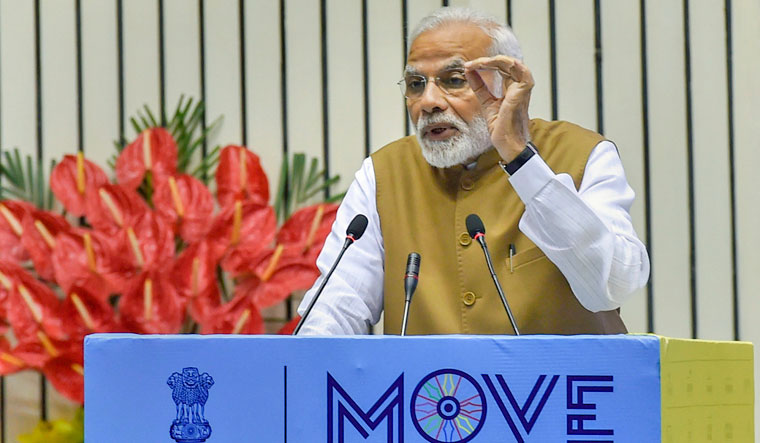Prime Minister Narendra Modi on Friday described his vision of future mobility in India based on 7 Cs—common, connected, convenient, congestion-free, charged, clean and cutting-edge. The prime minister said the government is going to focus largely on cleaning up public and goods transport.
“India does not carry a legacy of resource blind mobility and solutions built on the back of private car ownership. Thus it gives us a window of opportunity to create an all-new seamless mobility ecosystem,” PM Modi said addressing the MOVE India global mobility summit hosted by NITI Aayog at Vigyan Bhavan today.
The prime minister said India's strength in the IT sector, digital payments and internet-enabled shared economy are all elements that are shaping future mobility.
He urged the business leaders present at the summit to pay heed to ensure that public transport is preferred over private modes of travel in the times to come—a common living index parameter followed in most developed economies.
"Common public transport must be the cornerstone of our mobility initiatives. New business models driven by digitisation, are reinventing the existing paradigm. Our focus must also go beyond cars, to other vehicles such as scooters and rickshaws," Modi said.
Modi said he hoped that India built the template for the “world to adopt”. Modi clarified that the government would majorly focus on enabling not just environment-friendly, but also seniors, women and specially-abled friendly modes of public transportation.
If executed, this could help India largely in meeting her environment-related commitments towards the Global Climate Change Pact and under the Sustainable Development Goals (SDG), both prescribed by the UN.
On Friday, Modi said that India should champion the idea of clean kilometres and focus on the pollution-free clean drive. "Clean mobility powered by clean energy is our most powerful weapon in our fight against climate change. This means a pollution-free clean drive, leading to clean air and better living standards for our people. We should champion the idea of 'clean kilometres'," he said.
He announced the launch of FAME II, (Faster Adoption and Manufacturing of Hybrid & Electrical Vehicles)—the second phase of FAME India scheme, aimed to incentivise mass adoption of electric vehicles (EV), with an outlay of Rs 5,500 crore.
FAME is the more contemporary version of the National Mission on Electric Mobility of 2011. The incentive scheme for EVs was adopted under the guidance of Ashok Jhunjhunwala of IIT, Chennai, in November 2015, after which he chaired the FAME-India Scheme till resigning earlier this year.
Data of the National Automotive Board of the department of heavy industries, showed that since its adoption the FAME-India scheme have incentivised registration and purchase of 231,478 EVs in the country, resulting in 32.4 million litres of fuel saved and 81.16 million tonnes of CO2 reduced.
The data of EVs showed that purchase of EVs under the scheme comprised largely of electric two-wheelers. Three wheelers used mostly as last-mile-connect were comparatively lesser, given their density, followed by electric four-wheelers.
FAME II will continue for five years and offer a subsidy to all categories of EVs sold. In future, EVs would also include taxis and electric buses used in public transportation, in order to promote green vehicles and check pollution, said Amitabh Kant, CEO, NITI Aayog, while addressing the same conference later.
The second phase of the scheme seeks to be hinged on setting up of massive charging infrastructure to support electric vehicles, improving battery technologies indigenously and more.
Under the FAME II scheme, battery-operated scooters and motorcycles are eligible for incentives ranging from Rs 1,800 to Rs 29,000, while in three-wheelers it is between Rs 3,300 and Rs 61,000.
However, in a major heartburn for some automakers and a sigh of relief for some, strong hybrid vehicles, which were entitled to incentives in the FAME I scheme, will no more be allowed to avail incentives in the second phase. This would lead to higher costs for selling these vehicles and could well spell an end of an era of the popular fossil fuel & electric powered vehicles.
“Automotive is one of the strongest contributors to the Indian economy. With these path-breaking initiatives introduced by NITI Aayog, India is perfectly positioned in the mobility space on the back of strong technological advancements,” said Guenter Butschek, MD & CEO of Tata Motors, after the announcements today.
“While it is important for the industry to be inclusive, sustainable and transformational, the future of efficient clean and sustainable mobility solutions lies in CESS i.e. Connected, Electrified, Shared and Safe,” Butschek said.
Other industry leaders, like the Swedish electrical major, ABB, also promoted the use of its revolutionary technologies, which can charge a passenger car in eight minutes and allow it to run for a journey of 200 km.
“India can leapfrog other nations by embracing e-mobility now, and become a world leader in sustainable transport while reducing emissions and dependence on imported fossil fuels. At the same time, India can use e-mobility as a lever to move its industry up the value chain and to drive economic growth,” advised Ulrich Spiesshofer, chief executive officer of ABB, who spoke at the mobility summit later.
The government today said it has renewed its focus also on promoting the use of environment-friendly fossil fuels, including biofuels.



